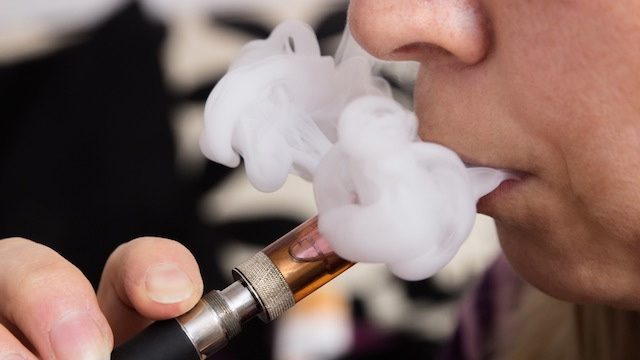SUMMARY
This is AI generated summarization, which may have errors. For context, always refer to the full article.

MANILA, Philippines – The Department of Health (DOH) is calling on medical practitioners to include vaping in their line of questions when recording patients’ medical histories.
This would allow “existing health information systems to capture data on vaping-related disorders” and also guide future policy-making on e-cigarettes,” Health Secretary Francisco Duque III told reporters Thrusday, October 17.
He added that even medical schools should start training students on including questions about e-cigarette use in taking medical histories. (READ: U.S. study shows chemical burns associated with e-cigarette use)
The World Health Organization has introduced a specific code for vaping-related illnesses in its International Classification of Diseases. ICD-10 is an extensive code system that helps document and compile cases of different diseases across the world.
The code for “acutely ill patients who have used e-cigarettes in the last 90 days, with no other plausible causes for illness” is U07.0. Duque urged medical practitioners to follow this code for better surveillance of vaping-related complications.
Duque said the DOH does not support claims that e-cigarettes are healthy or safe alternatives to regular cigarettes. He cited the epidemic of vaping-related complications in the US, which has seen 26 deaths out of a total of 1,299 cases, according to the US-based Centers for Disease Control and Prevention (CDC). These vaping-related illnesses mostly afflict otherwise healthy children.
The health secretary, along with heads of Philippine medical societies, also said on Thursday that because of the relative novelty of widespread e-cigarette use, even medical professionals are in the dark when it comes to identifying vaping-related complications.
There have been anecdotal cases, but no study directly linking e-cigarette use with lung illness, said Maricar Limpin of the Philippine Heart Center. Some anecdotes include experiences of allergic rhinitis and nosebleeds due to vaping.
“Direct causality has to be further established, but [we as doctors] are ethically bound to protect all Filipinos from any harm, even if it’s just a ‘small’ harm,” said Limpin, pointing to the fact that e-cigarettes are marketed as less harmful than regular cigarettes.
“It doesn’t need to be a Filipino who gets it (illness). The findings in the US should be enough. Those have been confirmed, and we shouldn’t let what is happening there happen here,” she said in a mix of Filipino and English.
The DOH urged health professionals “to be vigilant in identifying risks during routine clinical evaluations by taking the history of tobacco use and use of e-cigarettes or vapes in all patients.”
Duque also called on users to stop vaping, especially young adults pregnant women as it could harm infants in the womb.
‘Temporary setback’
The DOH is facing a “temporary setback” in implementing the administrative order that regulates e-cigarettes following the issuance of court injunctions against the AO last week.
Two e-cigarette distributors are challenging the constitutionality of the agency’s AO. The first hearing is set for Friday, October 18.
Duque said the court injunctions are a “temporary setback,” as regulation of e-cigarettes will be effectively put on hold until the courts decide.
But in the end, he said, “it’s not just a legal issue, it’s a public health issue” adding that he hopes for a swift resolution of the case.
Duque added that “it doesn’t preclude us from spreading the facts [about e-cigarettes]. It is our view that we cannot let this go on and on and compromise the health of our children,”
“These products endanger the health of both users and non-users, and are clearly not meant for children,” the health chief said.
AO No. 2019-0007, released on June 14, requires manufacturers, distributors, and sellers of e-cigarettes or electronic nicotine delivery systems (ENDS) to first secure from the Food and Drug Administration (FDA) a license to operate before going into business. (READ: E-cigarettes: 5 things to know)
FDA Director General Eric Domingo said that since the FDA opened registration to manufacturers, distributors, and sellers in September, the FDA has received 152 applications, mostly from retailers.
Some of them have been approved, although the FDA did not give an exact figure. – Rappler.com
Add a comment
How does this make you feel?
There are no comments yet. Add your comment to start the conversation.